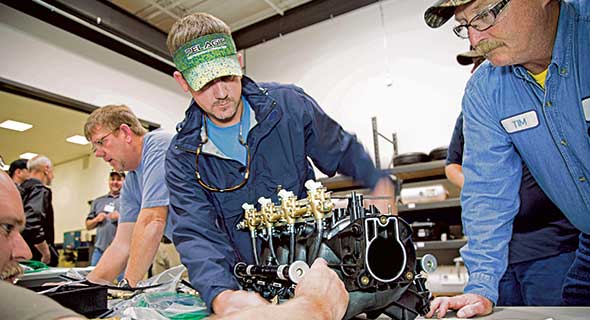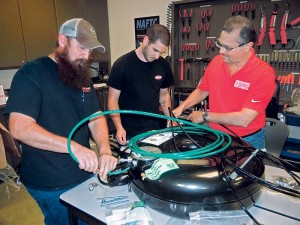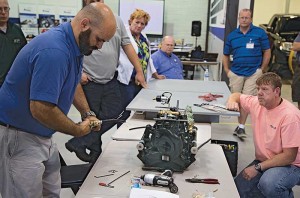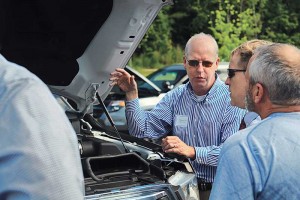Vehicle technician curriculum represents step forward for autogas

Participants work on a propane autogas fuel system during a National Alternative Fuels Training Consortium (NAFTC) course. Photo courtesy of NAFTC
Two candidates vie for an available automotive technician position.
The first candidate has a standard résumé, with a background in gasoline and diesel fuel systems. The second has the same background in traditional fuel systems as the first, but the second also has a background in systems powered by electricity, natural gas, propane autogas and other alternative fuel sources.
So, who’s the better candidate for the job?
“The more knowledge technicians have, the more likely they’re going to get into the workforce,” says Stuart Flatow, vice president of safety and training at the Propane Education & Research Council (PERC).
Similarly, as more autogas vehicles are added to roads across the United States, more knowledgeable technicians are needed to provide service to them. Fuel system providers and their partners have trained techs over the last few years as the market has grown, but more training is arguably needed to keep up with vehicle needs and ultimately fulfill autogas’ market potential.
To that end, PERC partnered with the National Alternative Fuels Training Consortium (NAFTC), a West Virginia University program, to develop a new course to train techs on safely diagnosing and troubleshooting autogas vehicles. Development of the NAFTC course, titled Propane Autogas Vehicle Technician Training, was completed late last year. The course has since been incorporated into curriculum at a number of NAFTC-member automotive schools. The PERC-funded course has also been available at strategic sites across the United States in a consolidated, three-day format.
Autogas stakeholders are confident both formats of the introductory course will help to expand the base of technicians who can service propane-powered vehicles.
“Much of the fate of the autogas market rests with an ample number of qualified technicians available to service and maintain [vehicles],” says Todd Mouw, vice president of sales and marketing at Roush CleanTech.
Partnering up

Stuart Flatow, vice president of safety and training at the Propane Education & Research Council (pictured at far right), works alongside participants in a NAFTC course to hook up the fuel delivery on a toroidal propane autogas tank. Photo courtesy of NAFTC
According to Micheal Smyth, assistant director of training and curriculum development at NAFTC, PERC first approached his organization in 2013 based on requests from propane marketers who sought to provide automotive techs with basic training on autogas vehicles. NAFTC had offered an autogas training program in the past, but that curriculum did not cover the latest wave of technologies.
Still, when evaluating NAFTC, PERC saw strengths in the organization as a potential partner.
“I thought I could probably hire some consultants and get a training program together,” Flatow says. “But with NAFTC, I feel like we’re partnering with an entire infrastructure because NAFTC members include 50 automotive technology schools.”
The development of the Propane Autogas Vehicle Technician Training did not happen overnight, though. NAFTC hosted a series of meetings with autogas stakeholders to gather input, and it leaned largely on PERC to provide resources that could be organized into a useful curriculum.
“When we initially asked for information to put this together, our curriculum developers were overwhelmed with response,” says Bill Davis, NAFTC director. “[We] literally received thousands of pages to determine what would be in the manual. After preparation of the initial version, PERC, NAFTC members and others reviewed, updated and made comments to the material.”
NAFTC’s expertise in curriculum development isn’t limited to autogas. The organization has developed courses for a range of fuels over the years, making it an obvious partner for PERC.
“They’re recognized within Clean Cities groups, DOE (Department of Energy) groups, and stakeholders and thought leaders as they apply to all fuels,” Flatow says of NAFTC. “It’s nice to connect to that name. They will maintain the curriculum on their dime. They update it before every training course based on feedback.”
The course

David Kennedy, director of autogas design at Alliance AutoGas, demonstrates the installation of a propane autogas fuel rail and the injectors. Representatives from organizations like Alliance AutoGas have had the opportunity to speak at the three-day NAFTC course. Photo courtesy of NAFTC
A 422-page textbook supports the course, and every participating student receives a copy for future reference. Instructors at participating technical and community colleges can break the course into smaller chunks that students can digest over a semester or half-semester, Davis says. Most of the schools either offer the Propane Autogas Vehicle Technician Training course as a supplement incorporated in their standard coursework or as a component in a separate alternative fuels track.
To date, 90 percent of NAFTC member schools responding to a survey have indicated they implemented the course or have plans to implement it, Smyth says.
“The class is designed to educate an experienced automotive technician totally unfamiliar with autogas and give them an introduction into autogas technologies,” Smyth says. “We educate on propane, its properties, how autogas is moving into the automotive market, the different manufacturers of propane autogas conversion kits, how the vehicles operate and common components of autogas fuel systems.”
While the technical and community college course tends to draw students just learning the automotive trade, the three-day course has attracted in-service personnel, as well as propane marketers who are evaluating autogas for their companies.
“We have learned that the audience runs the entire gamut, from propane marketers who are small independent marketers to those [for whom] this course may be a little too basic,” says Flatow, referring to the three-day course.
“We’re thinking about partnering with companies for a day-and-a-half diagnostics course for those who already know the basics.
“It’s the first year and we’re looking to get funded for more next year,” Flatow adds.
In the three-day course, multiple conversion kits are utilized to give participants a look at fuel system components and their applications, Smyth says.
“On the last day of the course, we invite in an industry subject matter expert to give a detailed presentation on their company’s autogas offerings,” he says.
Blossman Gas and Icom North America are among the companies that have hosted a three-day course and offered experts as resources. Representatives from both companies say the NAFTC course is a step in the right direction for the propane industry.
“The training was exceptional from NAFTC,” says Albert Venezio, chairman at Icom North America. “Our guys walked students through the Icom system on the last day. We spent about an hour with eight or nine propane companies who wanted to know how to sell propane autogas. A few of them told us that really helped them to get it.”
Ed Hoffman, president at Blossman Services, agrees.
“It’s important that we have a set and regimented training program for autogas,” Hoffman says. “I applaud the NAFTC, West Virginia University and PERC for having a program.”
Building a network

Happy Fox, alternative fuel consultant at Alliance AutoGas, visits with technicians at the Autogas Research & Technology Center in Asheville, North Carolina, during an event focused on improving air quality by reducing carbon dioxide emissions. A three-day Propane Autogas Vehicle Technician Training course was also held at the research center this year. Photo courtesy of Blossman Gas
Beyond the training course, a related next step Hoffman considers a must is the development of more organized service networks. Vehicle maintenance should be a given for customers who purchase propane-powered vehicles, he says.
“You may have some pockets or solutions that have been created, but nothing to allow [autogas] to scale,” says Hoffman, whose company founded Alliance AutoGas, an international network made up of more than 120 members that provide autogas solutions to medium- and heavy-duty fleets. “There have been cases with pilot projects on autogas, and because of a lack of service support the phase two expansion of those projects may have been inhibited.”
Some of the earliest adopters of new autogas technologies were capable of handling their own maintenance, Hoffman adds. Now that the industry has pressed deeper into the fleet vehicle market, more customers rely on outsiders for support.
Vehicle maintenance has at least gotten simpler because of system designs, according to Hoffman.
“The good news is that today’s autogas systems, when properly designed, don’t have large requirements for maintenance,” Hoffman says. “We were in the universal conversion kit world a couple years ago when every install was done differently. There was no set way to install, and you had a lot more challenges. You couldn’t remotely diagnose because you didn’t know how it was installed.”
Still, more work must be done related to service to assure customers that autogas is a long-term solution.
“A service network isn’t four guys and a pickup truck driving across the country,” Hoffman says. “Some field personnel are trying to react like that, and they’re never able to react to a customer quick enough. You must have an established base.”
More:
>Service techs: Who are they?
>Propane Autogas Vehicle Technician Training course rundown
















